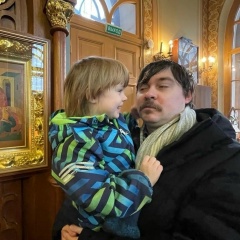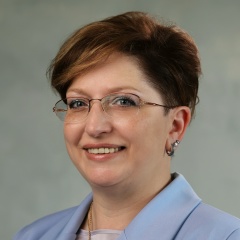Вопрос. Раскольники ссылаются на пример преподобного Максима Исповедника: когда его убеждали вступить в евхаристическое общение с еретиками и говорили, что все патриархи приняли монофилитство, тот ответил, что если весь мир примет ересь, то он все равно останется с истиной. Верно ли раскольники на основании этого делают заключение, что одному человеку во всем мире можно хранить истину?
Ответ. Преподобный Максим сказал — “если весь мир”, но само слово если свидетельствует о том, что он вовсе не допускал этого, оно означает, что фраза условна. Здесь риторический прием, когда гипербола подчеркивает и усиливает мысль о том, что истина выше всего, в том числе евхаристического общения с царем и патриархами, принявшими ересь. Здесь еретики пытались обмануть преподобного Максима, говоря, что вся вселенская Церковь приняла монофилитство, и он ясно видел эту ложь. Ересь приняли только Константинопольский и Антиохийский патриархи, а Иерусалимский патриарх и Римский папа сразу же отвергли ее. Александрийский патриарх принял ересь временно, по ошибке, а затем, убежденный Максимом Исповедником, вернулся к Православию. В Константинопольской и Антиохийской Церквах большинство епископов, священников и мирян оставалось православными. Поэтому на VI Вселенском Соборе ересь монофилитства была отвергнута и осуждена. Преподобный Максим Исповедник отказался от совместного причастия с лицами, которые явно и всенародно приняли ересь, а в его лице пытались найти себе поддержку.
Преподобный Максим Исповедник, посвятивший свою жизнь борьбе с ересью, никогда не отождествлял вселенскую Церковь с еретиками и не пытался создать свою собственную Церковь.
Вопрос. Раскольники ссылаются на правила Константинопольского Собора (называемого Софийским по имени кафедрального собора) о том, что с епископом, учащим народ ереси, следует прервать молитвенную связь и не поминать его имени на литургии.
Ответ. В правилах Собора нет никакого основания для раскола как выхода из Церкви и образования новой иерархии, напротив, обвинители епископа должны обращаться с жалобой к местному собору и ожидать его решения. Если суд малого собора не удовлетворил какую-нибудь из сторон, то она может принести жалобу или апелляцию к большему — окружному собору, но до этого подчиниться решению первого суда епископов. Неподчинение соборному суду навсегда лишает права обращаться к высшей инстанции, так как само неповиновение становится обвинительным приговором. Что касается разрыва молитвенного общения с иерархом-еретиком, то здесь предполагается учение ереси в проповедях, которые являются органической частью богослужения, учение о ереси как о церковном догмате, упорство в еретическом мнении, несмотря на увещания со стороны епископов-собратьев. Разрыв молитвенного общения с архиереем — это временная мера до решения собора, который должен или оправдать архиерея, или отлучить его от Церкви, или принять от него покаяние. В то же время правило Софийского Собора запрещает выходить из повиновения епископа по причине личных подозрений. Все церковные каноны основаны на вере в то, что Дух Святый — Дух Истины — всегда будет пребывать в Церкви, и поэтому вселенская Церковь не может впасть в ересь и лишиться спасительной благодати. Ни одно правило святых Апостолов, Вселенских и поместных соборов не содержит даже намека на то, чтобы чистоту догматов можно было бы сохранить через ломку церковной структуры.
...Во время арианских, монофизитских и иконоборческих смут были периоды, когда казалось, что весь Восток погружается в ересь. К началу патриаршества святителя Григория Богослова в Константинополе из полутора тысяч храмов только один принадлежал православным. Почему же никто из православных архиереев не создал свою собственную Церковь с новой, идущей от него иерархией? Святитель Афанасий Александрийский большую часть своей жизни провел в ссылках и заключениях, однако он не объявил себя и своих сторонников новой Церковью, а боролся за Православие до самой смерти...
о. Рафаил (Карелин)
Ответ. Преподобный Максим сказал — “если весь мир”, но само слово если свидетельствует о том, что он вовсе не допускал этого, оно означает, что фраза условна. Здесь риторический прием, когда гипербола подчеркивает и усиливает мысль о том, что истина выше всего, в том числе евхаристического общения с царем и патриархами, принявшими ересь. Здесь еретики пытались обмануть преподобного Максима, говоря, что вся вселенская Церковь приняла монофилитство, и он ясно видел эту ложь. Ересь приняли только Константинопольский и Антиохийский патриархи, а Иерусалимский патриарх и Римский папа сразу же отвергли ее. Александрийский патриарх принял ересь временно, по ошибке, а затем, убежденный Максимом Исповедником, вернулся к Православию. В Константинопольской и Антиохийской Церквах большинство епископов, священников и мирян оставалось православными. Поэтому на VI Вселенском Соборе ересь монофилитства была отвергнута и осуждена. Преподобный Максим Исповедник отказался от совместного причастия с лицами, которые явно и всенародно приняли ересь, а в его лице пытались найти себе поддержку.
Преподобный Максим Исповедник, посвятивший свою жизнь борьбе с ересью, никогда не отождествлял вселенскую Церковь с еретиками и не пытался создать свою собственную Церковь.
Вопрос. Раскольники ссылаются на правила Константинопольского Собора (называемого Софийским по имени кафедрального собора) о том, что с епископом, учащим народ ереси, следует прервать молитвенную связь и не поминать его имени на литургии.
Ответ. В правилах Собора нет никакого основания для раскола как выхода из Церкви и образования новой иерархии, напротив, обвинители епископа должны обращаться с жалобой к местному собору и ожидать его решения. Если суд малого собора не удовлетворил какую-нибудь из сторон, то она может принести жалобу или апелляцию к большему — окружному собору, но до этого подчиниться решению первого суда епископов. Неподчинение соборному суду навсегда лишает права обращаться к высшей инстанции, так как само неповиновение становится обвинительным приговором. Что касается разрыва молитвенного общения с иерархом-еретиком, то здесь предполагается учение ереси в проповедях, которые являются органической частью богослужения, учение о ереси как о церковном догмате, упорство в еретическом мнении, несмотря на увещания со стороны епископов-собратьев. Разрыв молитвенного общения с архиереем — это временная мера до решения собора, который должен или оправдать архиерея, или отлучить его от Церкви, или принять от него покаяние. В то же время правило Софийского Собора запрещает выходить из повиновения епископа по причине личных подозрений. Все церковные каноны основаны на вере в то, что Дух Святый — Дух Истины — всегда будет пребывать в Церкви, и поэтому вселенская Церковь не может впасть в ересь и лишиться спасительной благодати. Ни одно правило святых Апостолов, Вселенских и поместных соборов не содержит даже намека на то, чтобы чистоту догматов можно было бы сохранить через ломку церковной структуры.
...Во время арианских, монофизитских и иконоборческих смут были периоды, когда казалось, что весь Восток погружается в ересь. К началу патриаршества святителя Григория Богослова в Константинополе из полутора тысяч храмов только один принадлежал православным. Почему же никто из православных архиереев не создал свою собственную Церковь с новой, идущей от него иерархией? Святитель Афанасий Александрийский большую часть своей жизни провел в ссылках и заключениях, однако он не объявил себя и своих сторонников новой Церковью, а боролся за Православие до самой смерти...
о. Рафаил (Карелин)
Question. The schismatics cite the example of the Monk Maximus the Confessor: when he was persuaded to enter into Eucharistic communion with heretics and said that all patriarchs accepted monophilitism, he replied that if the whole world accepted heresy, he would still remain with the truth. Is it true that the schismatics, on the basis of this, conclude that one person in the whole world can keep the truth?
Answer. Rev. Maxim said - “if the whole world”, but if the word itself indicates that he did not allow this at all, it means that the phrase is conditional. Here is a rhetorical device when hyperbole emphasizes and strengthens the idea that truth is above everything, including Eucharistic communion with the king and the patriarchs who have accepted heresy. Heretics here tried to deceive the Monk Maxim, saying that the whole ecumenical Church accepted monophilitism, and he clearly saw this lie. The heresy was accepted only by the Patriarchs of Constantinople and Antioch, and the Patriarch of Jerusalem and the Pope of Rome immediately rejected it. The Patriarch of Alexandria took heresy temporarily, by mistake, and then, convinced by Maximus the Confessor, returned to Orthodoxy. In the Churches of Constantinople and Antioch, the majority of bishops, priests, and laity remained Orthodox. Therefore, at the Sixth Ecumenical Council, the heresy of monophilitism was rejected and condemned. The Monk Maximus the Confessor refused to participate in communion with persons who had clearly and popularly accepted heresy, and in his person tried to find support for themselves.
The Monk Maximus the Confessor, who devoted his life to the struggle against heresy, never identified the universal Church with heretics and did not try to create his own Church.
Question. The schismatics cite the rules of the Council of Constantinople (called Sophia by the name of the cathedral) that a prayer connection should be interrupted with a bishop teaching the heresy and not remember his name in the liturgy.
Answer. There is no reason for a split in the Council’s rules as a way out of the Church and the formation of a new hierarchy; on the contrary, the bishop’s accusers should complain to the local council and wait for its decision. If the court of the small council did not satisfy any of the parties, then it can bring a complaint or appeal to the larger - district council, but before that submit to the decision of the first court of bishops. Disobedience to the Council of the Court forever deprives the right to appeal to the highest authority, since disobedience itself becomes a guilty verdict. As for the breakdown of prayer communication with the heretic hierarch, here it is assumed that heresy is taught in sermons, which are an organic part of worship, the doctrine of heresy as a church dogma, perseverance in heretical opinion, despite admonitions from fellow bishops. The severance of prayer communication with the bishop is a temporary measure until the decision of the council, which should either justify the bishop, or excommunicate him, or accept repentance from him. At the same time, the rule of St. Sophia Cathedral prohibits withdrawal from the obedience of the bishop because of personal suspicions. All church canons are based on the belief that the Holy Spirit - the Spirit of Truth - will always remain in the Church, and therefore the universal Church cannot fall into heresy and lose saving grace. Not a single rule of the Holy Apostles, Ecumenical and Local Councils contains even a hint that the purity of dogmas could be preserved through breaking the church structure.
... During the Arian, Monophysite and Iconoclastic unrest, there were periods when it seemed that the whole East was plunging into heresy. By the beginning of the patriarchate of St. Gregory the Theologian in Constantinople, of the 1,500 churches, only one belonged to the Orthodox. Why, then, none of the Orthodox bishops created their own Church with a new hierarchy coming from it? Saint Athanasius of Alexandria spent most of his life in exile and conclusions, but he did not declare himself and his supporters as the new Church, but fought for Orthodoxy until his death ...
about. Raphael (Karelin)
Answer. Rev. Maxim said - “if the whole world”, but if the word itself indicates that he did not allow this at all, it means that the phrase is conditional. Here is a rhetorical device when hyperbole emphasizes and strengthens the idea that truth is above everything, including Eucharistic communion with the king and the patriarchs who have accepted heresy. Heretics here tried to deceive the Monk Maxim, saying that the whole ecumenical Church accepted monophilitism, and he clearly saw this lie. The heresy was accepted only by the Patriarchs of Constantinople and Antioch, and the Patriarch of Jerusalem and the Pope of Rome immediately rejected it. The Patriarch of Alexandria took heresy temporarily, by mistake, and then, convinced by Maximus the Confessor, returned to Orthodoxy. In the Churches of Constantinople and Antioch, the majority of bishops, priests, and laity remained Orthodox. Therefore, at the Sixth Ecumenical Council, the heresy of monophilitism was rejected and condemned. The Monk Maximus the Confessor refused to participate in communion with persons who had clearly and popularly accepted heresy, and in his person tried to find support for themselves.
The Monk Maximus the Confessor, who devoted his life to the struggle against heresy, never identified the universal Church with heretics and did not try to create his own Church.
Question. The schismatics cite the rules of the Council of Constantinople (called Sophia by the name of the cathedral) that a prayer connection should be interrupted with a bishop teaching the heresy and not remember his name in the liturgy.
Answer. There is no reason for a split in the Council’s rules as a way out of the Church and the formation of a new hierarchy; on the contrary, the bishop’s accusers should complain to the local council and wait for its decision. If the court of the small council did not satisfy any of the parties, then it can bring a complaint or appeal to the larger - district council, but before that submit to the decision of the first court of bishops. Disobedience to the Council of the Court forever deprives the right to appeal to the highest authority, since disobedience itself becomes a guilty verdict. As for the breakdown of prayer communication with the heretic hierarch, here it is assumed that heresy is taught in sermons, which are an organic part of worship, the doctrine of heresy as a church dogma, perseverance in heretical opinion, despite admonitions from fellow bishops. The severance of prayer communication with the bishop is a temporary measure until the decision of the council, which should either justify the bishop, or excommunicate him, or accept repentance from him. At the same time, the rule of St. Sophia Cathedral prohibits withdrawal from the obedience of the bishop because of personal suspicions. All church canons are based on the belief that the Holy Spirit - the Spirit of Truth - will always remain in the Church, and therefore the universal Church cannot fall into heresy and lose saving grace. Not a single rule of the Holy Apostles, Ecumenical and Local Councils contains even a hint that the purity of dogmas could be preserved through breaking the church structure.
... During the Arian, Monophysite and Iconoclastic unrest, there were periods when it seemed that the whole East was plunging into heresy. By the beginning of the patriarchate of St. Gregory the Theologian in Constantinople, of the 1,500 churches, only one belonged to the Orthodox. Why, then, none of the Orthodox bishops created their own Church with a new hierarchy coming from it? Saint Athanasius of Alexandria spent most of his life in exile and conclusions, but he did not declare himself and his supporters as the new Church, but fought for Orthodoxy until his death ...
about. Raphael (Karelin)
У записи 4 лайков,
1 репостов.
1 репостов.
Эту запись оставил(а) на своей стене Виктор Петров




















![Стас Однолетков -=[strast]=- Стас Однолетков -=[strast]=-](https://sun9-50.vkuserphoto.ru/s/v1/ig2/BQKIUfD3kthNCNNY9BS69xiPt_GjwVRhAU8D64L6gfeFjcmrTqYrLAC9NKgCppVxwhm79Mi5RypIHhjSHOhQK2uy.jpg?quality=95&crop=347,544,400,400&as=32x32,48x48,72x72,108x108,160x160,240x240,360x360&ava=1&cs=200x200)


